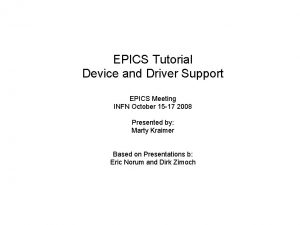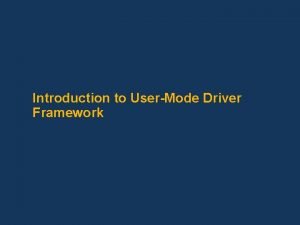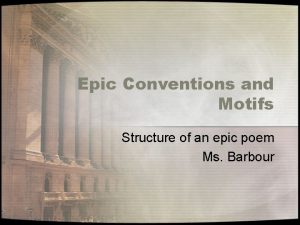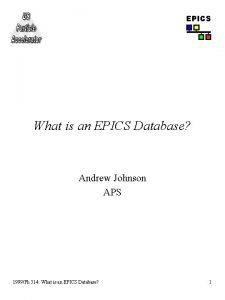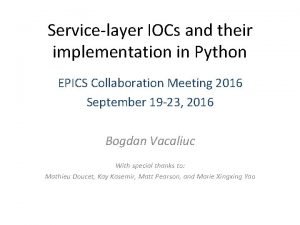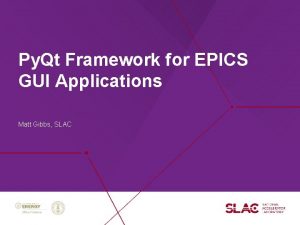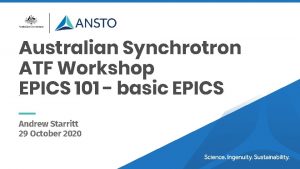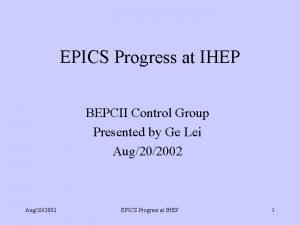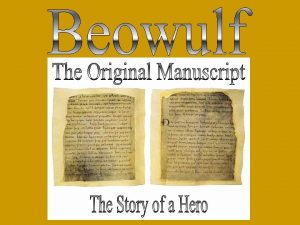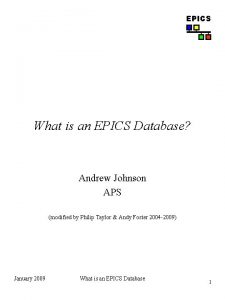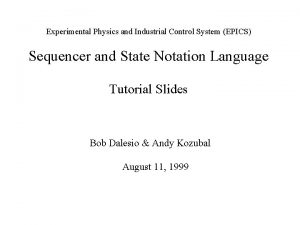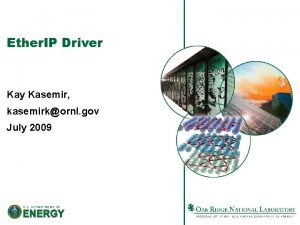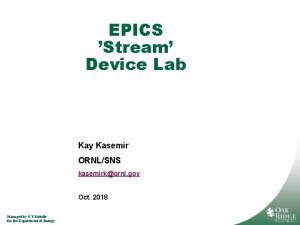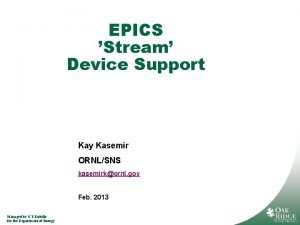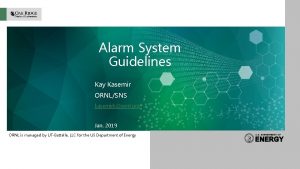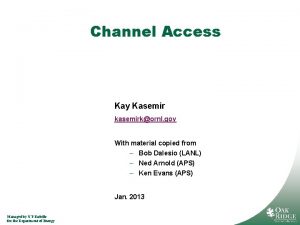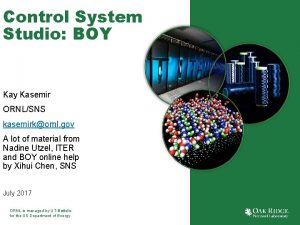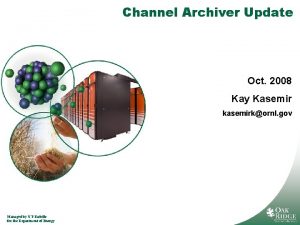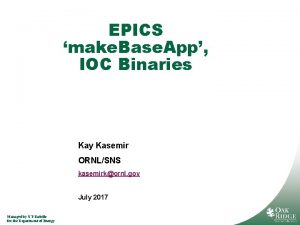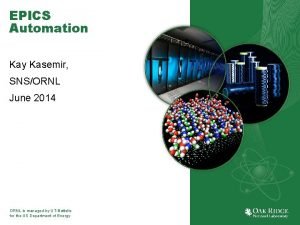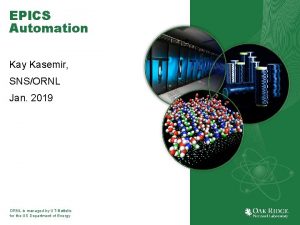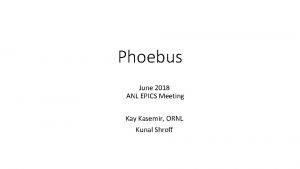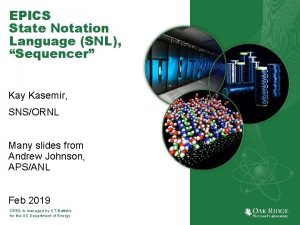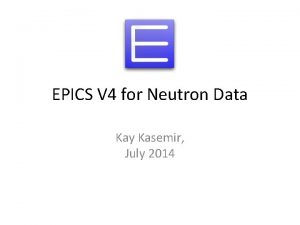EPICS Ether IP Driver Kay Kasemir kasemirkornl gov











![Reading, Writing, Scanning Records 1. 2. 3. 4. INP “@plc array[2]”, INP “@plc array[3]”, Reading, Writing, Scanning Records 1. 2. 3. 4. INP “@plc array[2]”, INP “@plc array[3]”,](https://slidetodoc.com/presentation_image/aa13f4364dd43f0dddef11fd2af4d215/image-12.jpg)
![Scan Flag “ S <seconds>” Records 1. 2. 3. 4. INP “@plc array[2]”, INP Scan Flag “ S <seconds>” Records 1. 2. 3. 4. INP “@plc array[2]”, INP](https://slidetodoc.com/presentation_image/aa13f4364dd43f0dddef11fd2af4d215/image-13.jpg)
![Elementary “ E” Flag Records 1. INP “@plc array[190]” 2. OUT “@plc array[191]” Driver Elementary “ E” Flag Records 1. INP “@plc array[190]” 2. OUT “@plc array[191]” Driver](https://slidetodoc.com/presentation_image/aa13f4364dd43f0dddef11fd2af4d215/image-14.jpg)
![Bitfiddly Stuff Internally, DINT and BOOL[32] look similar. Driver assumes bit for binary records. Bitfiddly Stuff Internally, DINT and BOOL[32] look similar. Driver assumes bit for binary records.](https://slidetodoc.com/presentation_image/aa13f4364dd43f0dddef11fd2af4d215/image-15.jpg)


![Transfer Time Histogram 352 BI @ 10 Hz, 3 x REAL[40] @ 2 Hz Transfer Time Histogram 352 BI @ 10 Hz, 3 x REAL[40] @ 2 Hz](https://slidetodoc.com/presentation_image/aa13f4364dd43f0dddef11fd2af4d215/image-18.jpg)

- Slides: 19

EPICS Ether. IP Driver Kay Kasemir kasemirk@ornl. gov Sept. 2014 Managed by UT-Battelle for the Department of Energy

Ether. Net/IP ? · Industrial Protocol, a. k. a. – Control. Net-over-Ethernet – TCP encapsulation of CIP (Control & Information Protocol) · Open Device. Net Vendor Association (ODVA) Routing, messages, objects, services, data types 2 Managed by UT-Battelle for the Department of Energy

EPICS “ether-ip” Support Ether. Net/IP spec: ü Connect & read serial number of ENET module Allen Bradley 1756 -RM 005 A-EN-E. pdf: ü Read & write PLC tags EPICS support: ü IOC records read/write PLC tags 3 Managed by UT-Battelle for the Department of Energy

History, Status · Developed ~2000 for SNS – Key to its operation: Vacuum, cryo, water, … – Now used by many EPICS sites · Convenient – Compared to serial, Control. Net, …: No special interface hardware nor wiring – Can read/write any tag on the PLC, no “publish” – “Fast enough” · Supports Allen. Bradley Control. Logix, Compact. Logix 4 Managed by UT-Battelle for the Department of Energy

PLC Requirements ENET Module, IP 10. 1. 2. 47 · ENET Module – Know the IP address – Know the CPU slot number One PLC could have multiple controllers! · Tags – Know tag names – “Controller” level, not! private to program – No need to “produce” 5 Managed by UT-Battelle for the Department of Energy Controller, Slot 0

EPICS Records Input Records (ai, bi, mbbi. Direct, stringin) field(DTYP, "Ether. IP") field(INP, "@my_plc name_of_tag") field(SCAN, "1 second”) Output Records (ao, bo, mbbo. Direct) field(DTYP, "Ether. IP") field(OUT, "@my_plc name_of_tag") 6 Managed by UT-Battelle for the Department of Energy

PLC Data Type Record Type REAL, INT, DINT ai, ao (REAL? VAL: RVAL) INT, DINT, BOOL[] bi, bo, mbb* BOOL bi, bo For arrays, access one element: field(INP, "@my_plc my_array[42]") For structures, access one element: field(INP, "@my_plc gadget. ps. voltage") 7 Managed by UT-Battelle for the Department of Energy

Starting the IOC: Development ‘soft. Ioc’ with Ether. IP built in Type this on one line: eip. Ioc -p my_plc=10. 1. 2. 47 –m "P=My. Prefix, N=2" –d example. db 8 Managed by UT-Battelle for the Department of Energy -p "name=ip, slot" Define PLC name for “@my_plc” in INP/OUT links, IP address, optional CPU slot -m "macro=value" Define database macros -d path/to/some. db Load database

Starting the IOC: Production Setup Add driver to ‘make. Base. App’ type IOC: configure/RELEASE: ETHER_IP=/path/to/share/ether_ip your. App/src/Makefile: your_DBD += ether_ip. dbd your_LIBS += ether_ip ioc. Boot/ioc. Yours/st. cmd: drv. Ether. IP_init() drv. Ether. IP_define_PLC("my_plc", "10. 1. 2. 47", 0) db. Load. Records(… 9 Managed by UT-Battelle for the Department of Energy

Arrays, Aliases · Arrays are MUCH more effective – – Read scalar REAL tag: 8 ms Read REAL[40]: 8 ms Read BOOL[352]: 8 ms Read 352 separate BOOL tags: ~352 * 8 ms · Records with INP or OUT that access – INP=“@plc my_array[2]” – INP=“@plc my_array[39]” à Driver reads my_array[0. . 39] 1. Arrange data in array tags ! 2. Configure INP/OUT to use array elements 3. May use alias tags within PLC logic 10 Managed by UT-Battelle for the Department of Energy

Driver Combines Tags used by Records 1. 2. 3. 4. INP INP “@plc 1 array. A[2]”, “@plc 1 array. A[3]”, “@plc 1 array. B[13]”, “@plc 2 array. A[2]”, SCAN “ 2 second” SCAN “ 1 second” SCAN “ 2 second” Driver 1. “plc” • Handle “array. A[0 -3]” every 2 seconds • Handle “array. B[0 -13]” every 1 second 2. “plc 2” 1. Handle “array. A[0 -2]” every 2 seconds 11 Managed by UT-Battelle for the Department of Energy
![Reading Writing Scanning Records 1 2 3 4 INP plc array2 INP plc array3 Reading, Writing, Scanning Records 1. 2. 3. 4. INP “@plc array[2]”, INP “@plc array[3]”,](https://slidetodoc.com/presentation_image/aa13f4364dd43f0dddef11fd2af4d215/image-12.jpg)
Reading, Writing, Scanning Records 1. 2. 3. 4. INP “@plc array[2]”, INP “@plc array[3]”, INP “@plc array[13]”, OUT “@plc array[5]”, SCAN “ 2 second” SCAN “ 1 second” SCAN “I/O Intr” SCAN “Passive” Driver “array[0 -13]” read every 1 second 1. Reads most recent value[2] every 2 seconds 2. . . [3] every 1 second, data may be 0. 999 sec old 3. Processes whenever value [13] changes 4. Reads (though output!) when value [5] changes. When processed, updates value [5], marks whole tag for writing. Driver will then once write instead of read. 12 Managed by UT-Battelle for the Department of Energy
![Scan Flag S seconds Records 1 2 3 4 INP plc array2 INP Scan Flag “ S <seconds>” Records 1. 2. 3. 4. INP “@plc array[2]”, INP](https://slidetodoc.com/presentation_image/aa13f4364dd43f0dddef11fd2af4d215/image-13.jpg)
Scan Flag “ S <seconds>” Records 1. 2. 3. 4. INP “@plc array[2]”, INP “@plc array[3]”, INP “@plc array[13]”, OUT “@plc array[5]”, SCAN “ 2 second” SCAN “ 1 second” SCAN “I/O Intr” SCAN “Passive” Driver Uses the “fastest” SCAN of any record related to a tag. Records 2 & 3 should add “@plc array[. . ] S 1” to provide suggested scan period, otherwise warning “cannot decode SCAN field, no scan flag given” 13 Managed by UT-Battelle for the Department of Energy
![Elementary E Flag Records 1 INP plc array190 2 OUT plc array191 Driver Elementary “ E” Flag Records 1. INP “@plc array[190]” 2. OUT “@plc array[191]” Driver](https://slidetodoc.com/presentation_image/aa13f4364dd43f0dddef11fd2af4d215/image-14.jpg)
Elementary “ E” Flag Records 1. INP “@plc array[190]” 2. OUT “@plc array[191]” Driver 1. Reads array[0. . 191], but we may only use [190], [191] “@plc array[190] E“ causes transfer of just that array element 2. Writes all of [0. . 191] even if just 191 was changed, writing elements which we otherwise wanted to read a) Use separate arrays for “writing” and “reading” b) Add “ E” to write just that element, not whole array 14 Managed by UT-Battelle for the Department of Energy
![Bitfiddly Stuff Internally DINT and BOOL32 look similar Driver assumes bit for binary records Bitfiddly Stuff Internally, DINT and BOOL[32] look similar. Driver assumes bit for binary records.](https://slidetodoc.com/presentation_image/aa13f4364dd43f0dddef11fd2af4d215/image-15.jpg)
Bitfiddly Stuff Internally, DINT and BOOL[32] look similar. Driver assumes bit for binary records. “some_tag[40]” a) ai, ao: Element 40 of a REAL, INT, DINT array b) bi, bo, mbb*: Bit 40 of a BOOL array, or bit 40 of a DINT array, i. e. bit 8 of DINT[1] To force [i] to be the ith array element: “some_tag[1] B 8” 15 Managed by UT-Battelle for the Department of Energy

Diagnosis on IOC · Set records’ TPRO field – Show when tag is read/written by that record · drv. Ether. IP_dump – Dumps all tags and their value · drv. Ether. IP_report level – Dumps info about each plc, period list, tag – Level 0. . 10 · EIP_verbosity(7), EIP_verbosity(10) – Show warnings or details of protocol 16 Managed by UT-Battelle for the Department of Energy

The Elusive Buffer Limit Driver combines several reads and writes for tags into one network transfer until either the request or the response reaches EIP_buffer_limit How large? About 500 bytes, details hairy Set too large PLC error “Buffer too small, partial data only” Set too small Inefficient, can’t combine many tags Set way too small Can’t read a single REAL[40] array, driver error “Tag ‘xyz’ exceeds buffer limit of. . Bytes” Don’t mess with the default EIP_buffer_limit. Keep arrays to REAL/DINT/INT[40] and BOOL[400]. Driver will then combine several of those in one transfer. 17 Managed by UT-Battelle for the Department of Energy
![Transfer Time Histogram 352 BI 10 Hz 3 x REAL40 2 Hz Transfer Time Histogram 352 BI @ 10 Hz, 3 x REAL[40] @ 2 Hz](https://slidetodoc.com/presentation_image/aa13f4364dd43f0dddef11fd2af4d215/image-18.jpg)
Transfer Time Histogram 352 BI @ 10 Hz, 3 x REAL[40] @ 2 Hz 18 Managed by UT-Battelle for the Department of Energy

Summary · Arrange PLC data in arrays – Separate ones for read, write – Maybe 40 elements per array (400 for BOOL) · Point records’ INP/OUT to those array tags · Done 19 Managed by UT-Battelle for the Department of Energy
